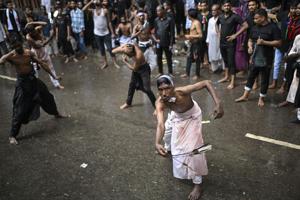Shiite Muslims across the globe are gathering to commemorate Ashoura, a significant religious observance that marks the martyrdom of Imam Hussein, the grandson of Prophet Muhammad. This annual event, steeped in history and spiritual significance, is observed with fervent rituals and ceremonies.
Ashoura, which falls on the 10th day of the Islamic month of Muharram, is a day of mourning for the Shiite community. It commemorates the Battle of Karbala in 680 AD, where Hussein was killed, an event that is pivotal to Shiite identity and faith.
The Historical Significance of Ashoura
The Battle of Karbala is not only a historical event but a symbol of the struggle against tyranny and injustice. Imam Hussein’s stand against the Umayyad caliph Yazid is seen as a fight for truth and justice, resonating deeply with Shiite Muslims today.
Dr. Ali Reza, a historian specializing in Islamic studies, explains, “Hussein’s martyrdom is a powerful reminder of the values of sacrifice and standing up against oppression. For Shiites, Ashoura is not just a day of mourning but a reaffirmation of their commitment to these ideals.”
Global Observances and Rituals
Ashoura is observed with various rituals that vary across countries and cultures. In places like Iran, Iraq, and Lebanon, processions are held where participants dress in black, chant elegies, and reenact the Battle of Karbala. In some regions, self-flagellation is practiced as a form of penance and expression of grief.
In contrast, countries like India and Pakistan see large gatherings where people listen to sermons and participate in communal meals. These events serve as a reminder of the communal and spiritual aspects of the observance.
“The diversity in Ashoura rituals reflects the cultural richness of the Shiite community worldwide,” says Professor Fatima Al-Hassan, an expert in religious studies.
Modern Implications and Reflections
The commemoration of Ashoura holds contemporary relevance as well. In today’s world, where issues of justice and human rights are at the forefront, the story of Imam Hussein continues to inspire many beyond the Shiite community.
According to a recent survey, over 70% of Shiite Muslims feel that the lessons of Ashoura are applicable to modern social justice movements. This underscores the enduring impact of Hussein’s legacy in advocating for ethical governance and societal equity.
Looking Forward: The Future of Ashoura Observances
As Shiite communities continue to grow globally, the observance of Ashoura is expected to evolve. Digital platforms are increasingly being used to connect communities and share the messages of Ashoura with a broader audience.
Experts predict that technological advancements will play a crucial role in how future generations engage with this historic event. Online forums, virtual reality reenactments, and global live-streaming of processions are just some of the ways Ashoura could be experienced in the future.
In conclusion, Ashoura remains a profound and influential observance for Shiite Muslims worldwide. As they gather to honor Imam Hussein’s sacrifice, the values of justice, courage, and resilience continue to resonate, offering guidance and inspiration for generations to come.
